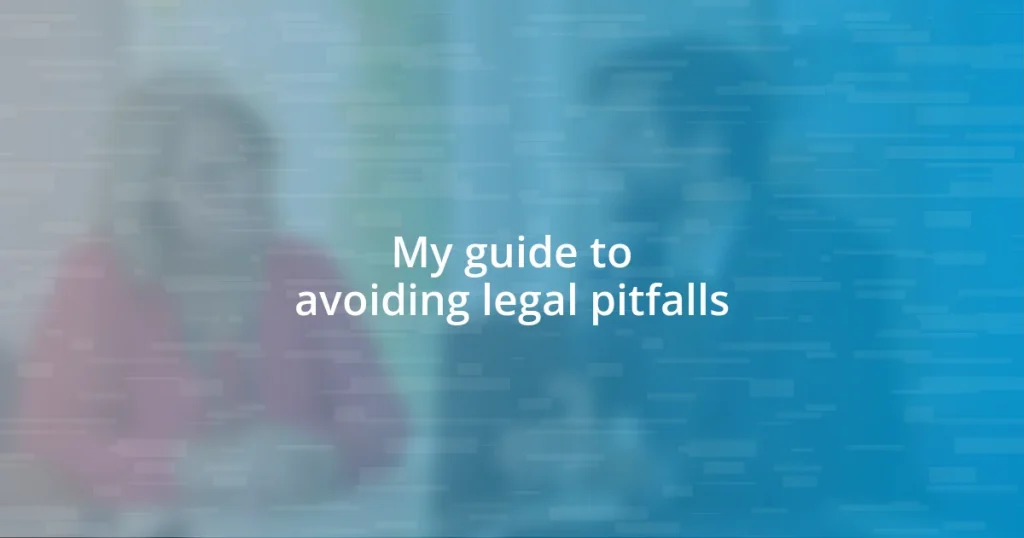Key takeaways:
- Understanding legal requirements and common issues, such as contracts and intellectual property, is crucial to avoid serious pitfalls in business.
- Consulting with legal professionals can clarify complex situations, offering peace of mind and proactive protection for your interests.
- Regularly reviewing contracts and creating compliance checklists fosters accountability and helps navigate legal landscapes effectively, reducing risks in business operations.
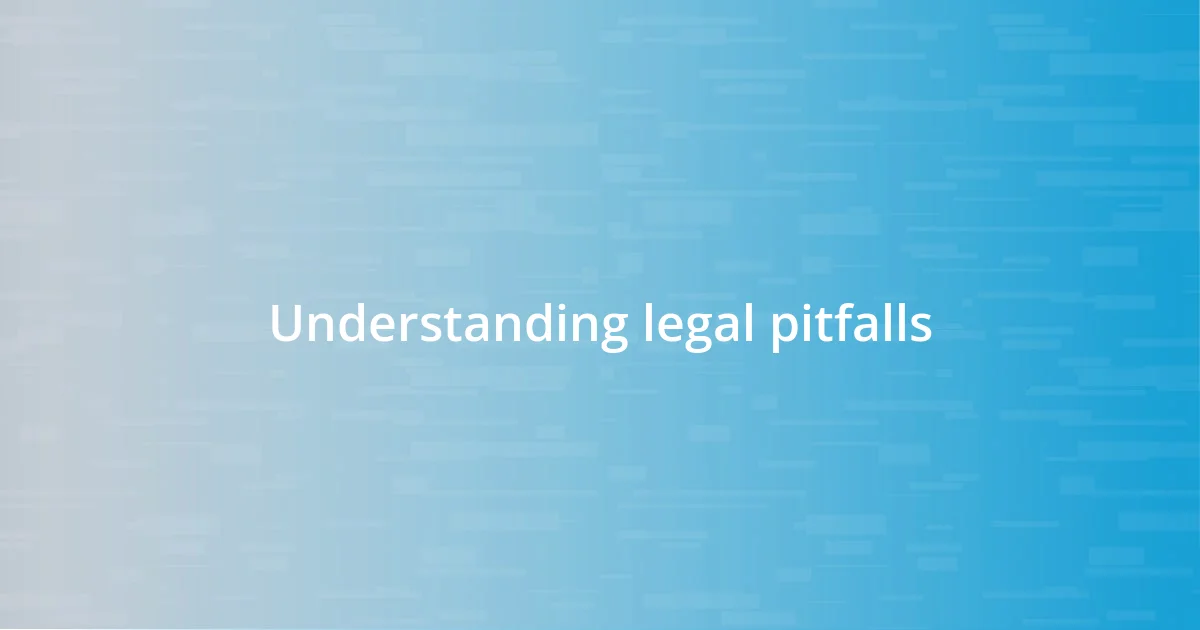
Understanding legal pitfalls
Legal pitfalls can sometimes feel like hidden traps waiting to ensnare the unwary. I remember a time when a friend of mine, eager to start a small business, overlooked the importance of understanding zoning laws. It led to costly fines and a major headache. How many times do we rush into decisions without fully grasping what’s at stake?
Each legal requirement feels like a new puzzle piece, and when one piece is missing, the whole picture can fall apart. I once encountered a situation where failing to draft a solid contract nearly resulted in a major financial loss for my own small operation. It made me realize just how fragile our efforts can be without the right protections in place. Have you ever found yourself in a position where a minor oversight turned into a massive roadblock?
The emotional toll of navigating legal pitfalls can be overwhelming. I’ve seen clients stress over compliance issues that seem insurmountable, leading to sleepless nights and strained relationships. It’s a reminder that understanding legal matters isn’t just about paperwork; it’s about safeguarding our peace of mind and future ambitions.
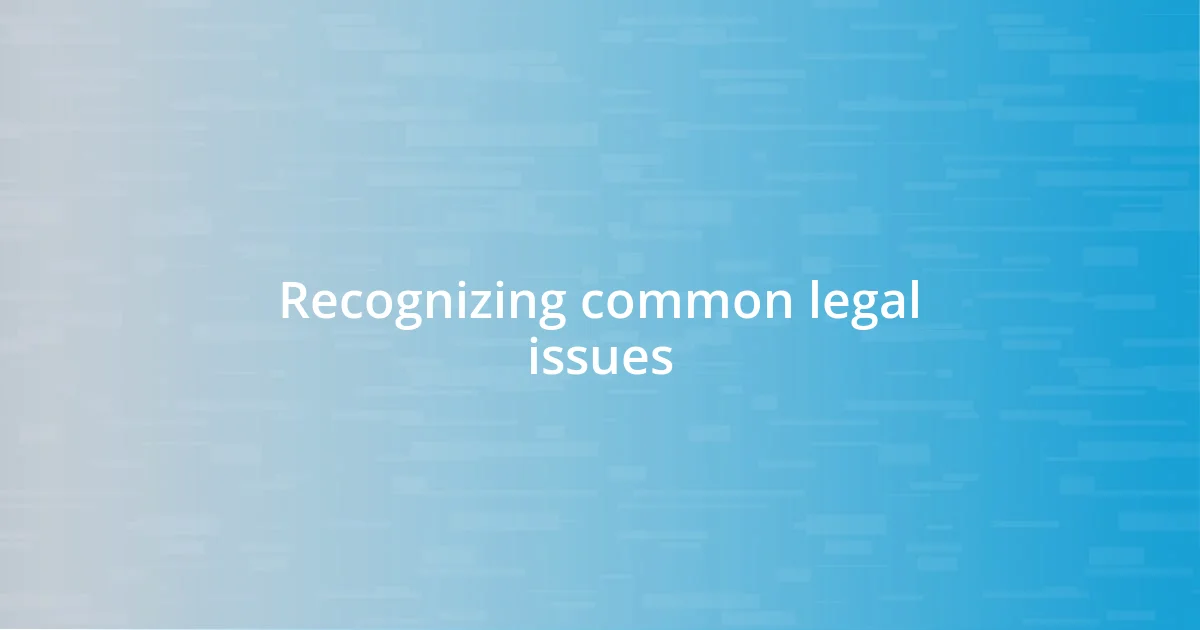
Recognizing common legal issues
Recognizing common legal issues is crucial for anyone looking to protect their interests. I’ve often noticed individuals underestimate the importance of contracts. It feels easy to assume that a handshake suffices, but I’ve learned the hard way that, without a formal agreement, misunderstandings can arise, leading to disputes that could have been easily avoided. I still remember a time when vague terms in an agreement between partners resulted in a lot of back-and-forth, causing delays and frustration that could have been prevented.
Another common legal issue is intellectual property. When I was working on a creative project, I failed to properly safeguard my ideas. It was disheartening to discover that someone had copied my concept and even secured a trademark for it. This experience taught me the importance of registering and protecting intellectual property rights—without this safeguard, your hard work could be replicated without your consent, leaving you feeling powerless.
Employment laws also pose significant challenges. In a past job, I encountered a situation where the company neglected to classify employees properly, leading to unpaid overtime and dissatisfaction among the team. It was a wake-up call for everyone involved, highlighting how crucial it is to stay informed about labor laws. Navigating these legal waters can be tricky, but being aware of these issues can save you a lot of heartache.
| Common Legal Issues | Personal Experience |
|---|---|
| Contracts | Underestimating their importance can lead to costly misunderstandings and disputes. |
| Intellectual Property | Failing to protect my ideas resulted in someone else benefiting from my hard work. |
| Employment Laws | Improper classification of staff can create dissatisfaction and legal complications. |
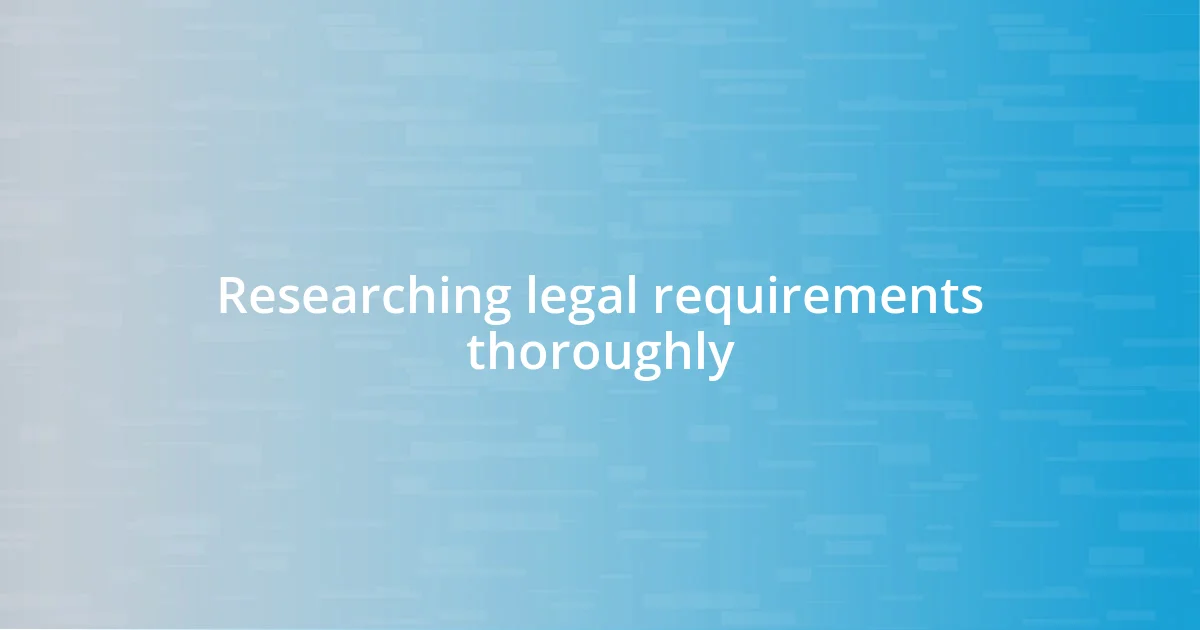
Researching legal requirements thoroughly
Researching legal requirements thoroughly is a task that often gets overlooked but is vital to avoid pitfalls. There was a time when I dove headfirst into a project without double-checking local licensing requirements. The result? An unexpected halt because I missed a crucial regulation. The frustration I felt was palpable, and it reinforced how much of a ripple effect such oversights can create. I can’t stress enough the importance of doing your homework—it’s one of the best ways to protect your endeavor.
When approaching legal research, here’s a handy checklist to guide you through the process:
- Identify applicable laws: Determine which laws govern your specific situation, whether they involve contracts, business operations, or property use.
- Consult reliable sources: Utilize government websites, legal databases, and professional organizations to get accurate information.
- Reach out for help: Don’t hesitate to consult with a legal expert if you’re unsure. A brief consultation can save you from significant headaches later on.
- Document everything: Keep records of your research and any correspondence for future reference. This creates a valuable trail that can aid you if disputes arise.
- Stay updated: Laws change, and it’s crucial to stay informed about any revisions that could impact your situation.
This approach not only minimizes risks but also empowers you with the knowledge needed to make confident decisions.
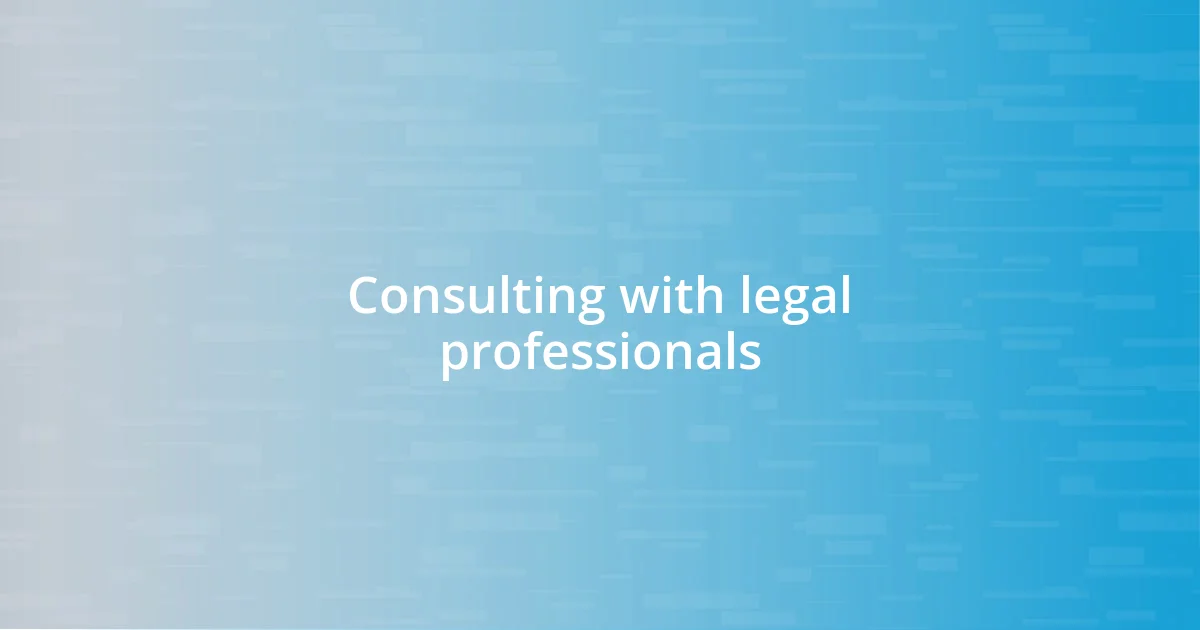
Consulting with legal professionals
Consulting with legal professionals is one of the smartest moves I’ve ever made. I vividly remember a time when I was about to sign a significant contract without fully understanding its implications. A mentor of mine insisted I consult a lawyer first. That hour of legal advice not only clarified complex terms but also helped me renegotiate a few points in my favor. It’s astonishing how a little guidance can transform your situation.
In my experience, many people feel intimidated by the idea of reaching out to a lawyer. I used to feel that way, too. But here’s the thing: these professionals are there to help you navigate the legal maze, not to intimidate you. When I finally started asking questions, I found myself gaining confidence and clarity. It’s true what they say—knowledge is power, and a good lawyer can equip you with the tools to protect your interests effectively.
I often ask myself, “What would I have done without that legal support?” It’s a sobering thought. The peace of mind that comes from knowing you’re covered legally is invaluable. With every consultation, I realized that seeking out legal advice isn’t just about avoiding pitfalls; it’s a proactive step toward securing a brighter and more stable future. This shift in perspective made a tremendous difference in how I approach my business decisions today.
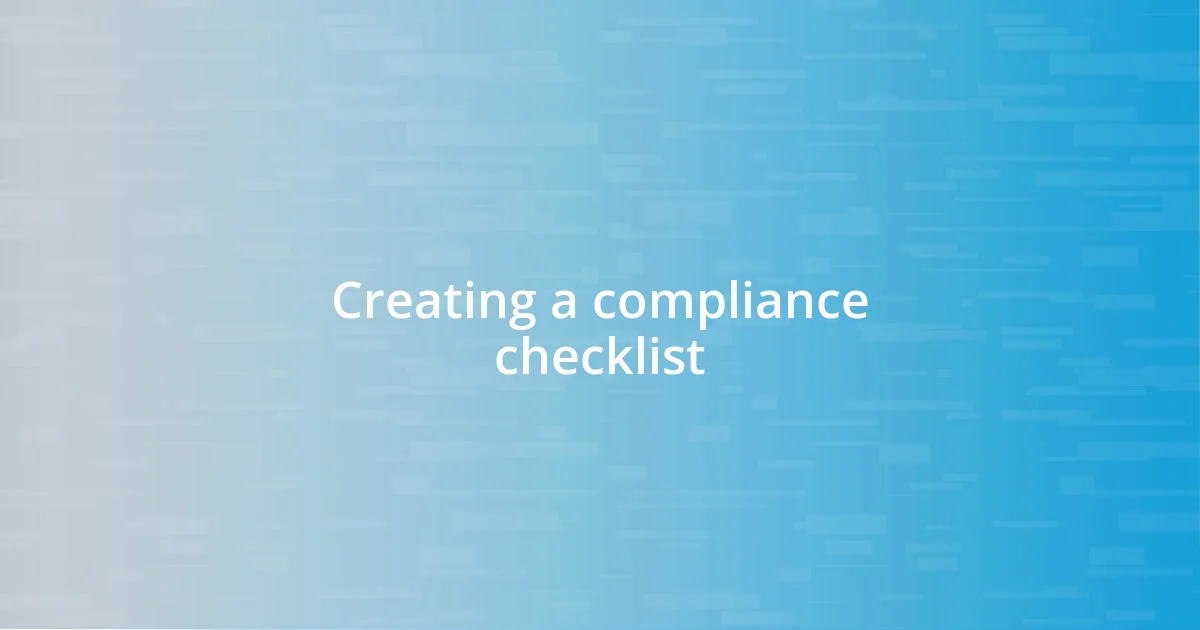
Creating a compliance checklist
Creating a compliance checklist is a game-changer for anyone looking to navigate legal requirements smoothly. I can recall when I first attempted to launch an online business and felt completely overwhelmed by all the regulations. After crafting a straightforward checklist, it felt like I had a roadmap in my hands, guiding me through the legal jungle. Each box I ticked off brought a sense of accomplishment and reassurance that I was on the right path.
To start, I recommend breaking down your checklist into manageable sections based on your specific industry and operations. I’ve found that sorting compliance requirements into categories—like licensing, employee regulations, and safety standards—creates a clearer picture. It’s like putting together a puzzle; as each piece falls into place, the overall image becomes clearer. Have you ever experienced the satisfaction of checking something off your list and realizing you’ve taken a giant leap forward? That feeling is immensely gratifying.
Don’t overlook the importance of regular updates to your checklist, either. I learned this lesson the hard way when I unearthed some overlooked compliance changes while preparing for a major project. The panic that ensued reminded me just how fast the legal landscape can shift. By reviewing and adjusting my checklist periodically, I not only mitigate risks but also foster a deeper understanding of my responsibilities. Staying proactive means I can focus on what really matters—growing my business without the looming fear of legal troubles.
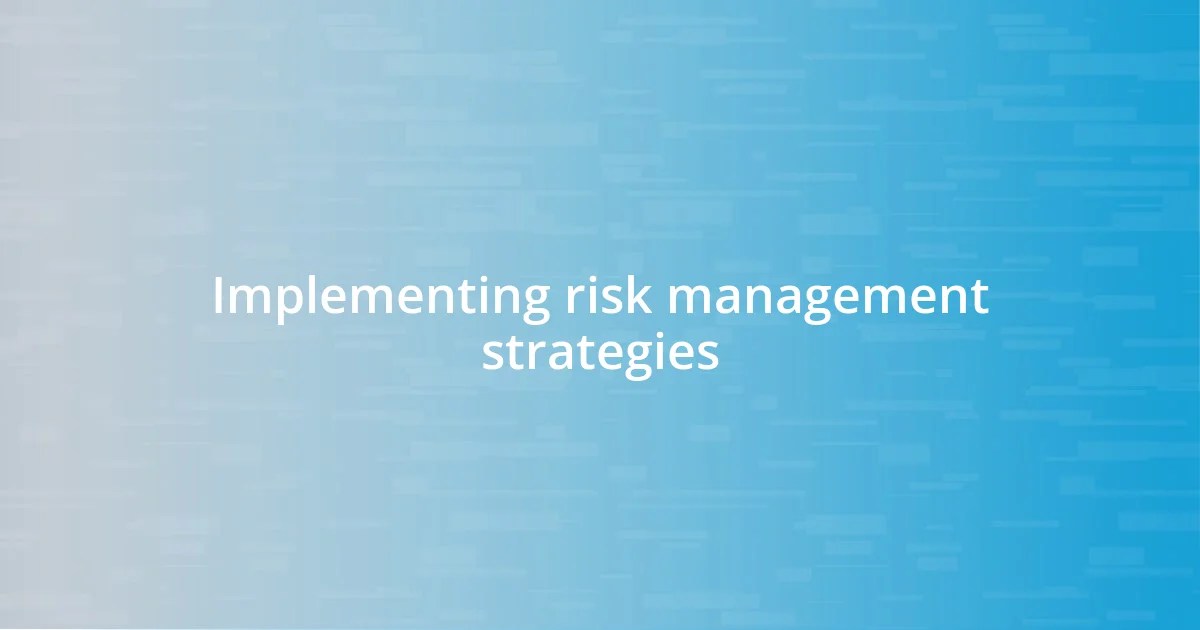
Implementing risk management strategies
Implementing risk management strategies is essential for navigating the unpredictable landscape of business. I remember when I first began to grasp the significance of identifying potential risks before they materialized. That realization came after a major project went south due to unforeseen supplier issues. By proactively evaluating vendors and creating backup plans, I’ve managed to steer clear of those pitfalls in subsequent endeavors.
In my experience, risk assessments don’t have to be overly complex. I found success in sitting down with my team to brainstorm potential challenges. This open dialogue not only raised crucial issues but also fostered a collaborative mindset. Have you ever noticed how brainstorming can bring light to problems you hadn’t considered? It’s fascinating how collective insight leads to tailored strategies that can fortify your operations against potential threats.
Moreover, documenting each strategy and action taken is a practice I wholeheartedly endorse. A few years ago, I neglected to keep a record of risk management actions during a particularly busy period. When an unexpected situation arose, I struggled to recall what we had previously established. That experience taught me that a clear and accessible log not only serves as a reference point but builds a culture of accountability. By doing so, I transform risk management from a chore into a core part of my business strategy, ultimately creating a safer space for growth.
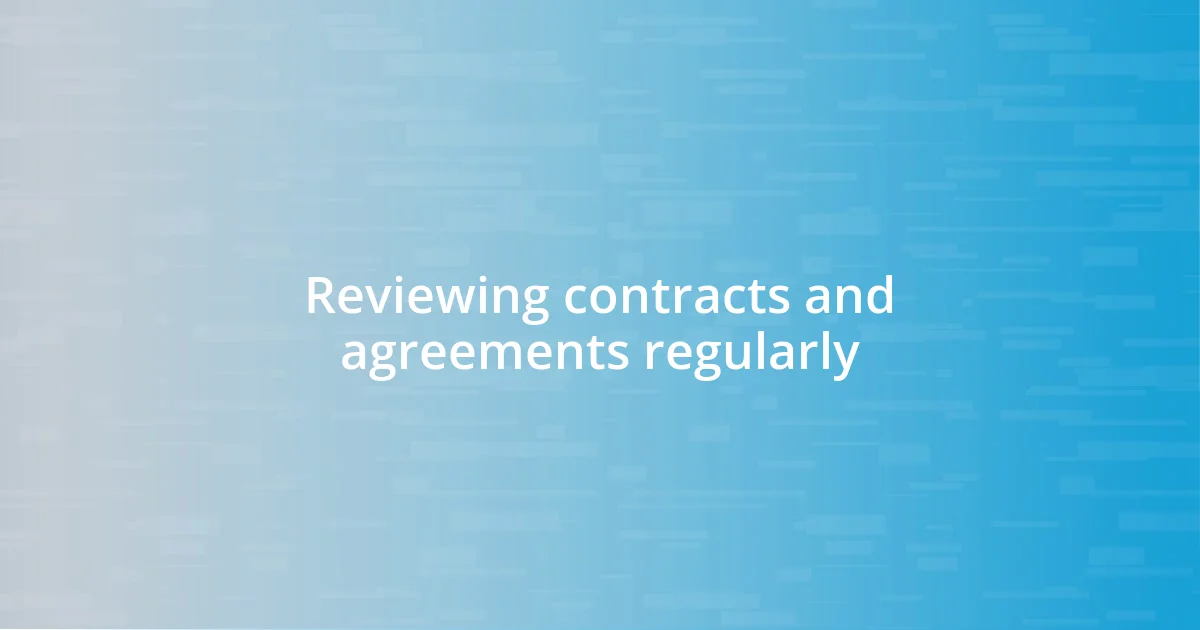
Reviewing contracts and agreements regularly
Reviewing contracts and agreements regularly is an essential practice that can save you from significant legal headaches down the road. I vividly remember a time when I stumbled upon a hidden clause in a partnership agreement that would have cost me dearly if I hadn’t caught it in time. Keeping contracts fresh in my mind makes me feel empowered and in control, preventing nasty surprises that can disrupt my business.
In my experience, I’ve learned that setting aside time every quarter to go through existing contracts can yield invaluable insights. Each review session feels a bit like a treasure hunt—sometimes uncovering opportunities for renegotiation or collaboration that I hadn’t initially noticed. How often do we rush through signing contracts without a second thought? Taking a few moments to deeply analyze agreements has, on more than one occasion, transformed a mundane obligation into a dynamic opportunity for growth.
It’s not just about timing, though; it’s about perspective. When I look over an agreement, I try to envision all possible outcomes, both good and bad. I recall a client contract where anticipating future needs led me to include clauses that ultimately protected my interests when the scope of work expanded. What surprises are hiding in your agreements? Regular reviews help ensure they’re not just safe but also working in your favor, giving you peace of mind as you navigate your business journey.











